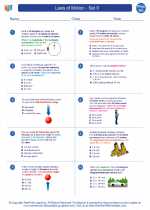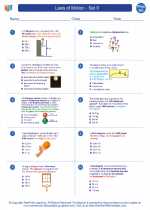Frequency in Physics
Frequency is a fundamental concept in physics, particularly in the study of waves and vibrations. In simple terms, frequency is the number of occurrences of a repeating event per unit of time. It is measured in hertz (Hz), where 1 Hz is equivalent to one cycle per second.
Understanding Frequency
In the context of waves, frequency refers to the number of complete oscillations or cycles of the wave that occur in a given time interval. For example, in the case of a sound wave, the frequency determines the pitch of the sound - higher frequencies correspond to higher pitches, and lower frequencies correspond to lower pitches.
Mathematical Representation
The frequency of a wave can be mathematically represented as:
f = 1 / T
Where f is the frequency and T is the period of the wave, which is the time it takes for one complete cycle to occur. The unit of frequency, hertz (Hz), is equivalent to one cycle per second.
Applications of Frequency
Frequency is a crucial parameter in various fields of physics and engineering, including:
- Electronics: Frequency is used to describe the oscillations of electric signals in circuits, and is a key factor in the design of electronic devices.
- Acoustics: The frequency of sound waves determines the perceived pitch of a sound, and is essential in the study of music and speech.
- Optics: Frequency is used to characterize electromagnetic waves, such as visible light, and is fundamental in the study of optics and photonics.
Study Guide: Frequency
When studying the concept of frequency, it is important to focus on the following key points:
- Understanding the definition of frequency as the number of oscillations or cycles per unit of time.
- Recognizing the relationship between frequency and period, and being able to convert between the two.
- Exploring the applications of frequency in different areas of physics and engineering.
- Practicing calculations involving frequency, period, and wavelength in the context of wave phenomena.
By mastering the concept of frequency and its applications, you will develop a deeper understanding of wave behavior and its significance in various scientific disciplines.
[Frequency] Related Worksheets and Study Guides:
.◂Physics Worksheets and Study Guides High School. Laws of Motion - Set II

 Worksheet/Answer key
Worksheet/Answer key
 Worksheet/Answer key
Worksheet/Answer key
